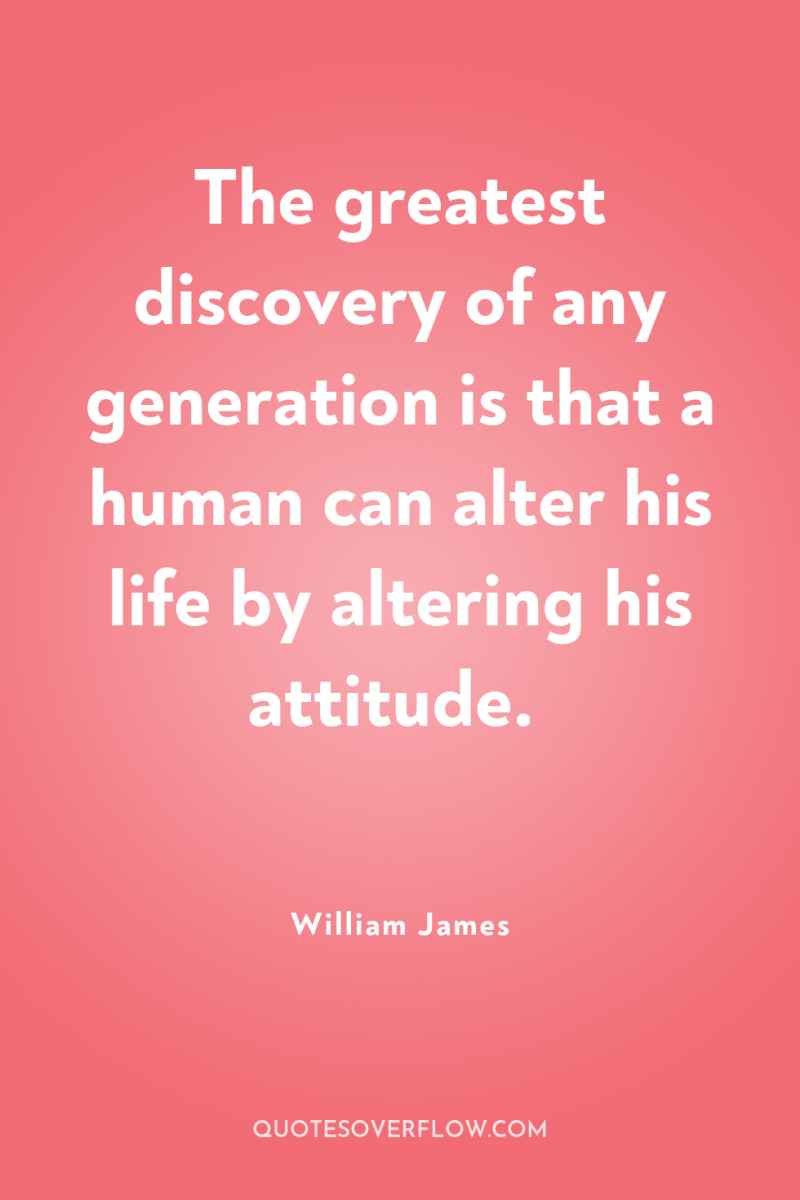
1
The greatest discovery of any generation is that a human can alter his life by altering his attitude.William James
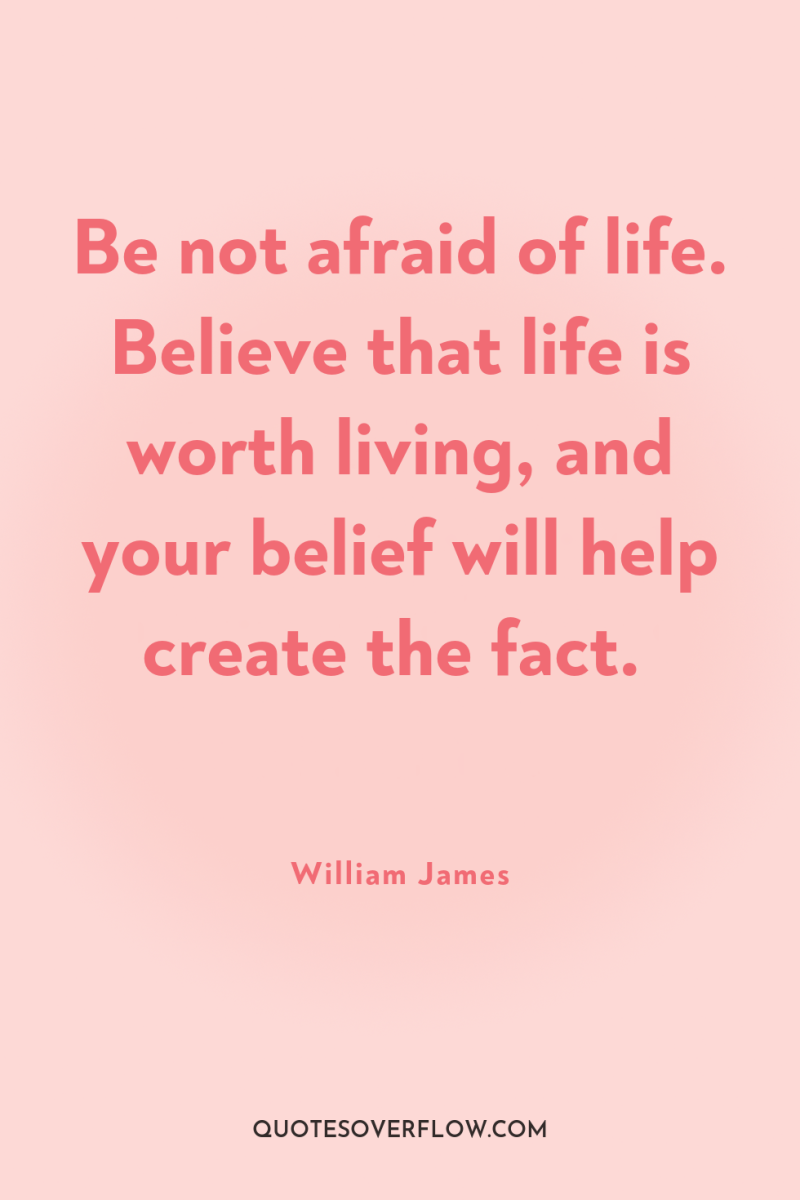
2
Be not afraid of life. Believe that life is worth living, and your belief will help create the fact.William James
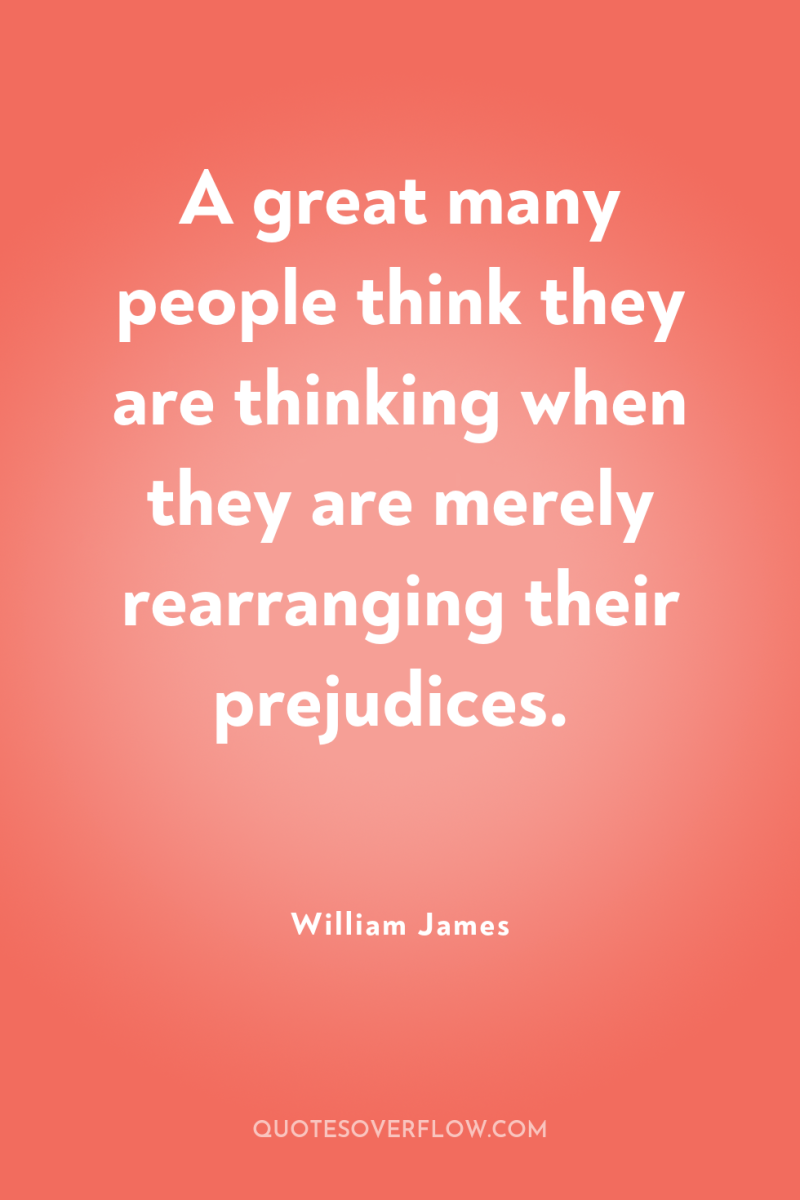
3
A great many people think they are thinking when they are merely rearranging their prejudices.William James
4
Pragmatism asks its usual question. "Grant an idea or belief to be true, " it says, "what concrete difference will its being true make in anyone's actual life? How will the truth be realized? What experiences will be different from those which would obtain if the belief were false? What, in short, is the truth's cash-value in experiential terms?William James
5
See the exquisite contrast of the types of mind! The pragmatist clings to facts and concreteness, observes truth at its work in particular cases, and generalises. Truth, for him, becomes a class-name for all sorts of definite working-values in experience. For the rationalist it remains a pure abstraction, to the bare name of which we must defer. When the pragmatist undertakes to show in detail just why we must defer, the rationalist is unable to recognise the concretes from which his own abstraction is taken. He accuses us of denying truth; whereas we have only sought to trace exactly why people follow it and always ought to follow it. Your typical ultra-abstractions fairly shudders at concreteness: other things equal, he positively prefers the pale and spectral. If the two universes were offered, he would always choose the skinny outline rather than the rich thicket of reality. It is so much purer, clearer, nobler.William James
6
It does not follow, because our ancestors made so many errors of fact and mixed them with their religion, that we should therefore leave off being religious at all. By being religious we establish ourselves in possession of ultimate reality at the only points at which reality is given us to guard. Our responsible concern is with our private destiny, after all.William James
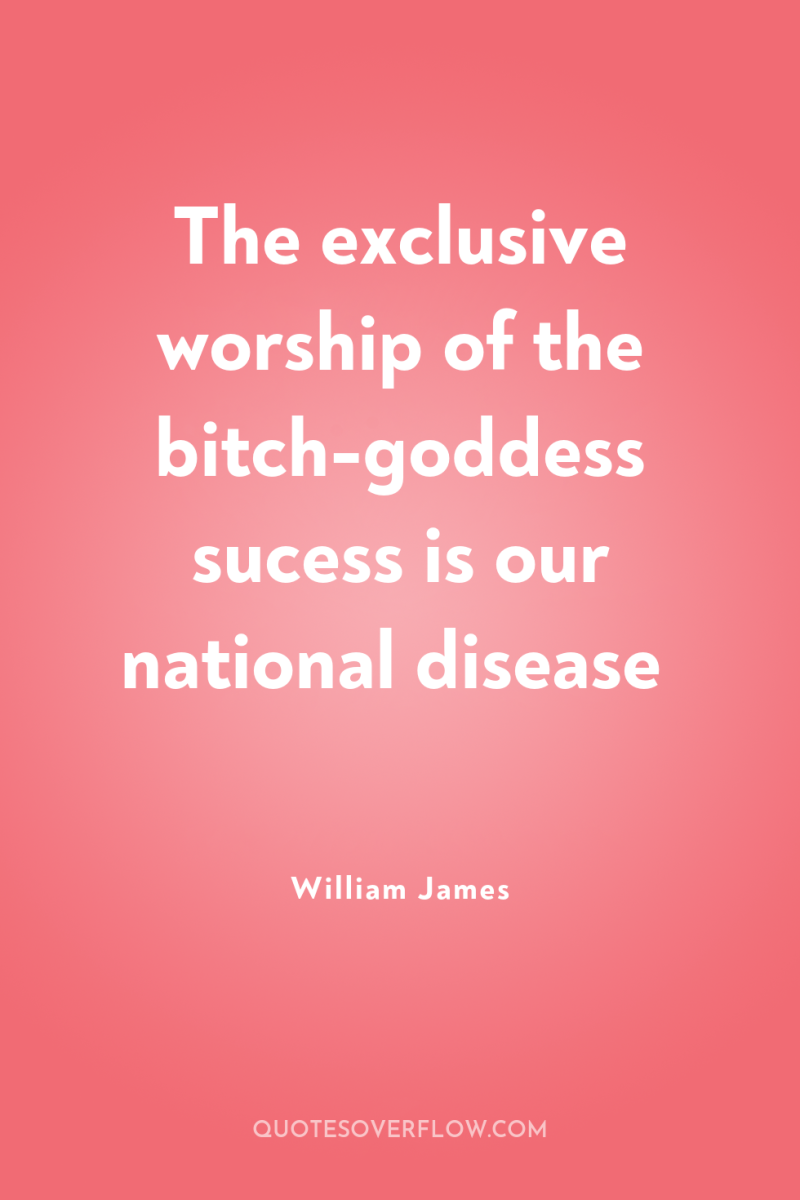
7
The exclusive worship of the bitch-goddess sucess is our national diseaseWilliam James
8
Metaphysics means nothing but an unusually obstinate effort to think clearly. The fundamental conceptions of psychology are practically very clear to us, but theoretically they are very confused, and one easily makes the obscurest assumptions in this science without realizing, until challenged, what internal difficulties they involve.William James

9
Wisdom is seeing something in a non-habitual manner.William James
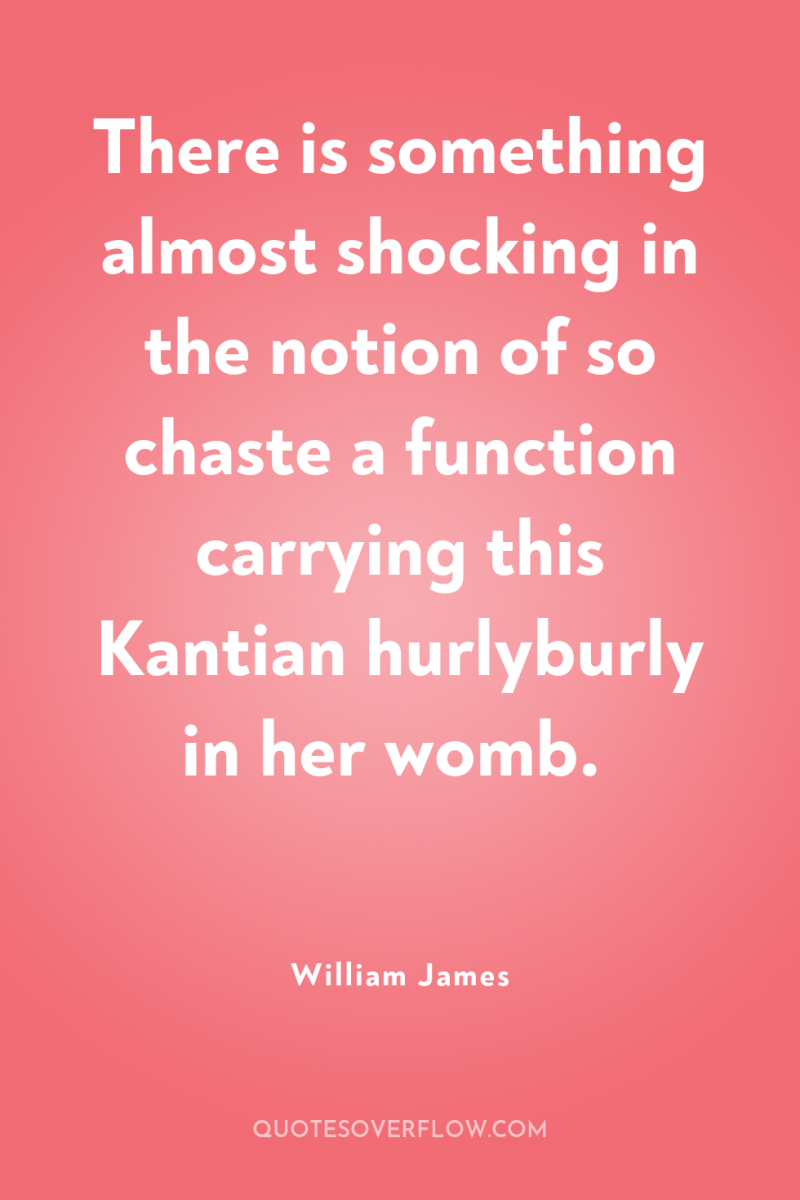
10
There is something almost shocking in the notion of so chaste a function carrying this Kantian hurlyburly in her womb.William James
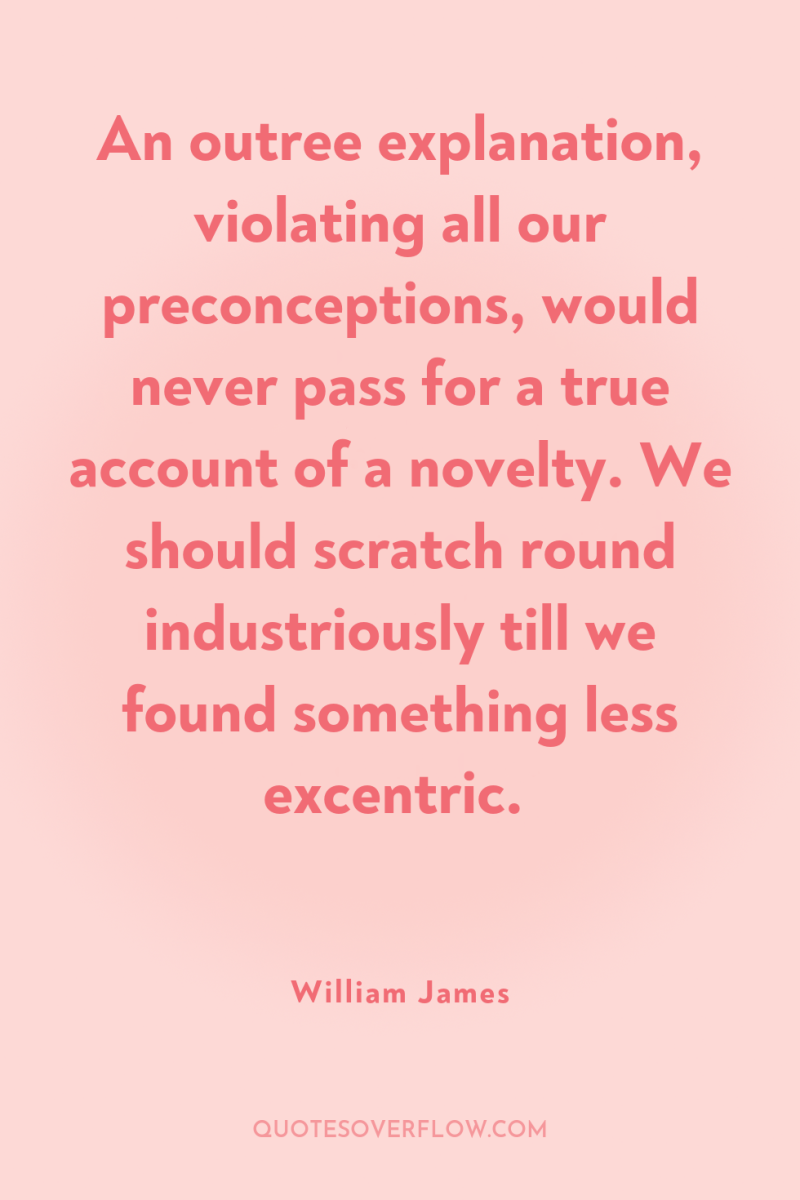
11
An outree explanation, violating all our preconceptions, would never pass for a true account of a novelty. We should scratch round industriously till we found something less excentric.William James
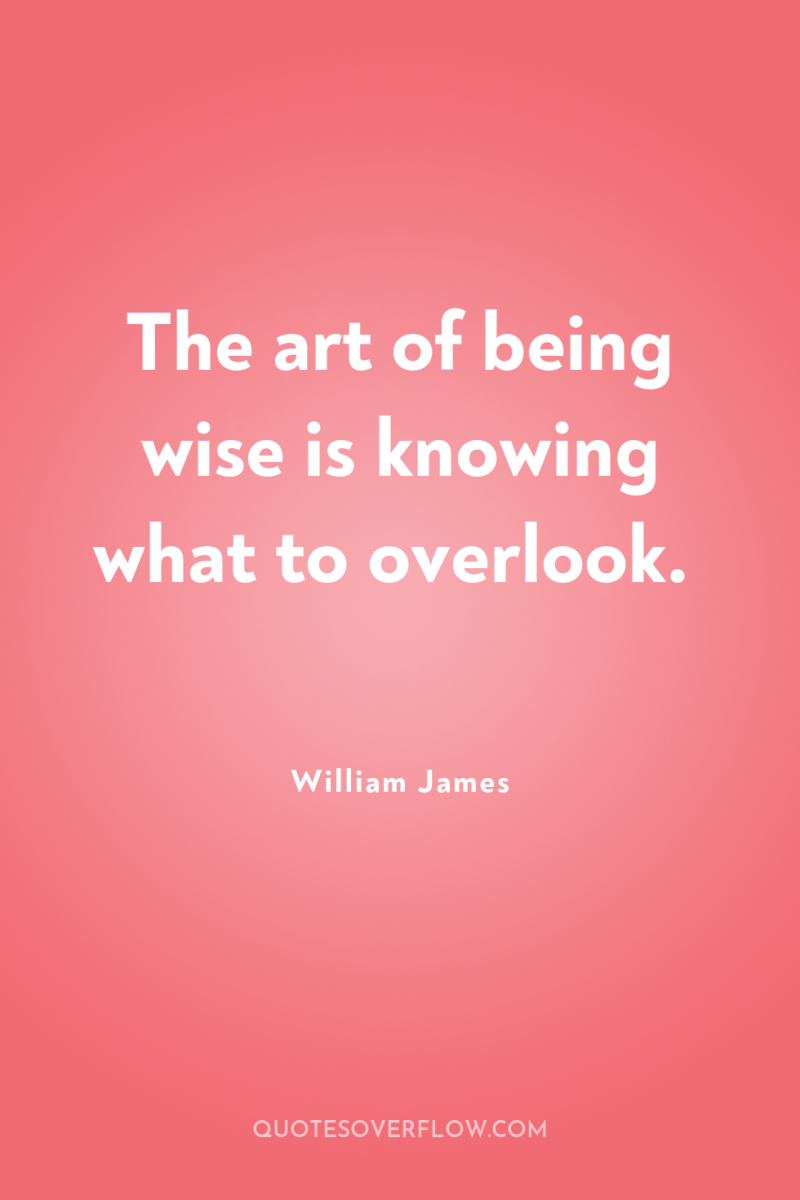
12
The art of being wise is knowing what to overlook.William James
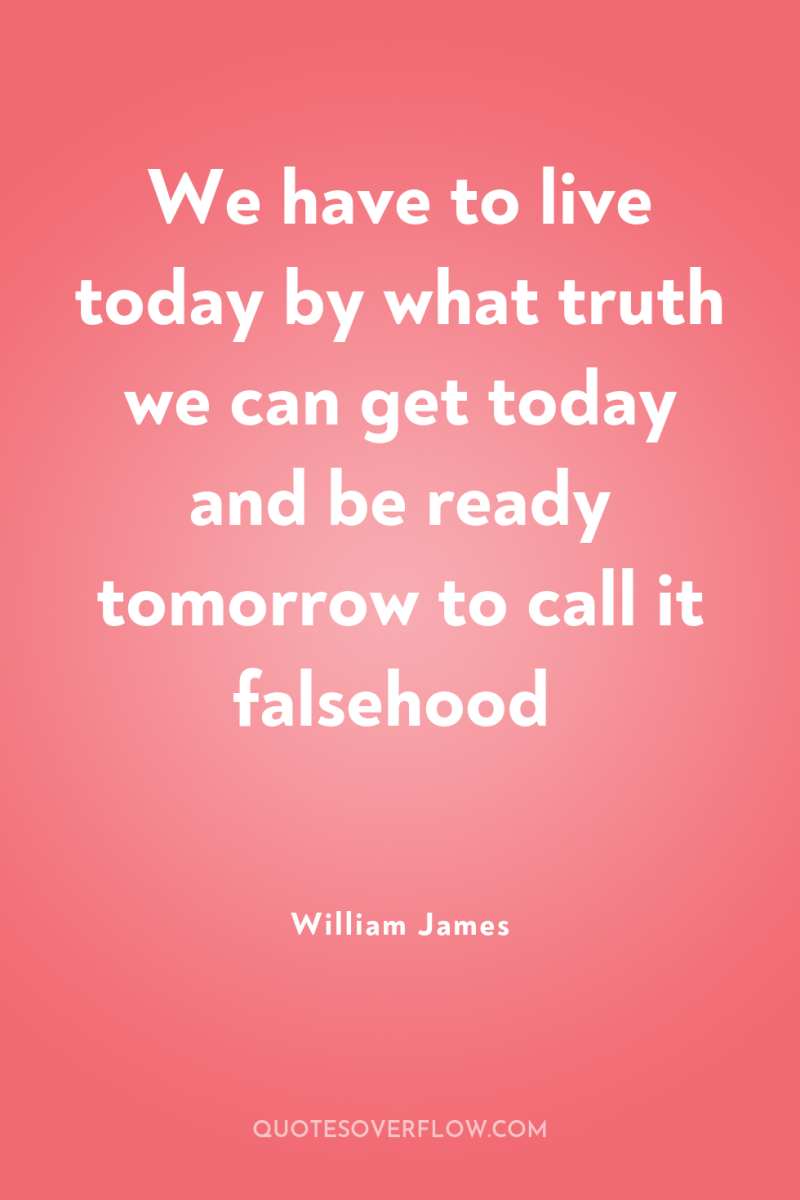
13
We have to live today by what truth we can get today and be ready tomorrow to call it falsehoodWilliam James
14
Action may not always bring happiness, but there is no happiness without action.William James
15
We must judge the tree by its fruit. The best fruits of the religious experience are the best things history has to offer. The highest flights of charity, devotion, trust, patience, and bravery to which the wings of human nature have spread themselves, have all been flown for religious ideals.William James
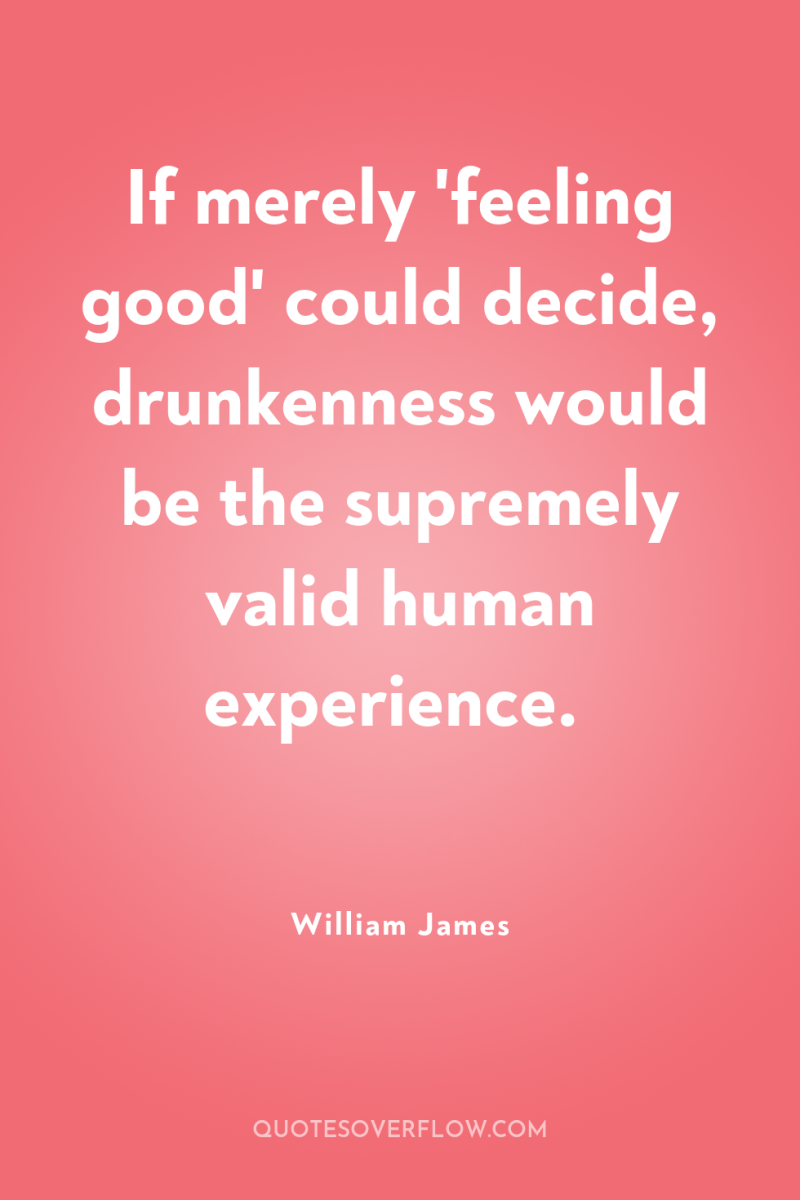
16
If merely 'feeling good' could decide, drunkenness would be the supremely valid human experience.William James

17
Belief creates the actual fact.William James
18
It is as if a man should hesitate indefinitely to ask a certain woman to marry him because he was not perfectly sure that she would prove an angel after he brought her home. Would he not cut himself off from that particular angel-possibility as decisively as if he went and married some one else? Scepticism, then, is not avoidance of option; it is option of a certain particular kind of risk. Better risk loss of truth than chance of error, -that is your faith-vetoer's exact position. He is actively playing his stake as much as the believer is; he is backing the field against the religious hypothesis, just as the believer is backing the religious hypothesis against the field. .William James
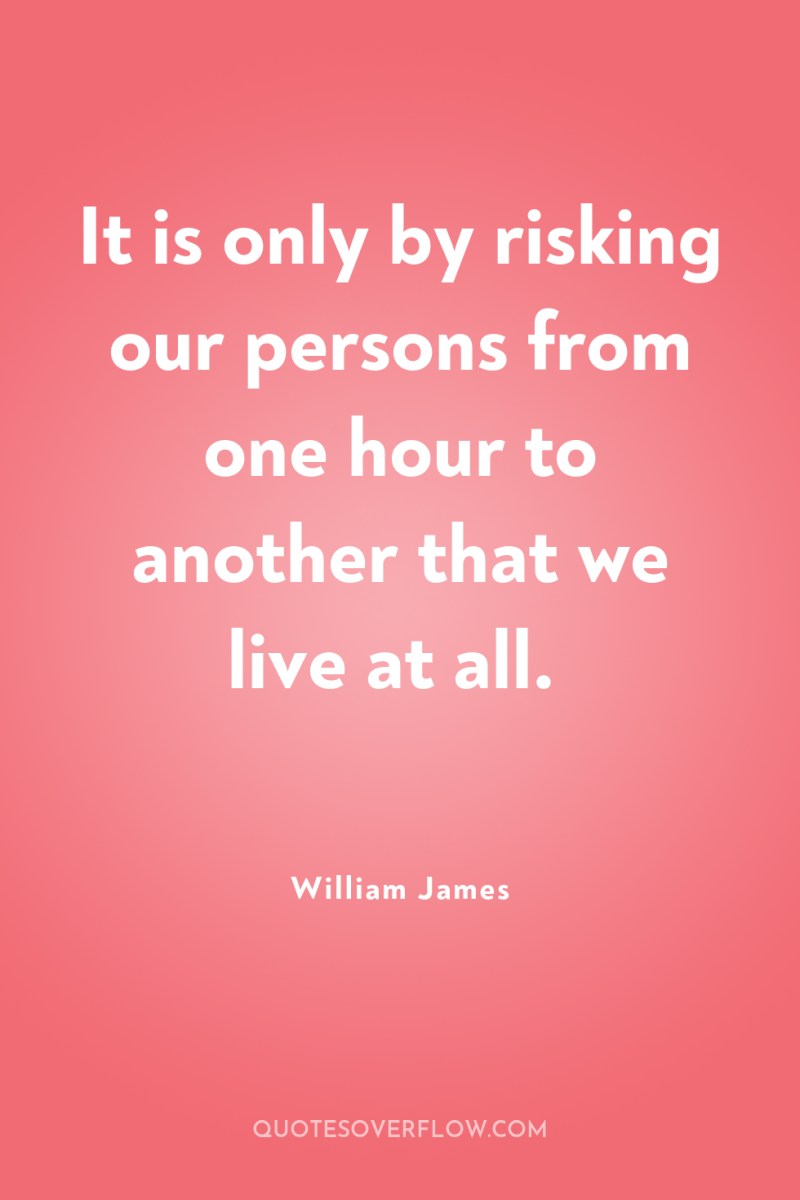
19
It is only by risking our persons from one hour to another that we live at all.William James
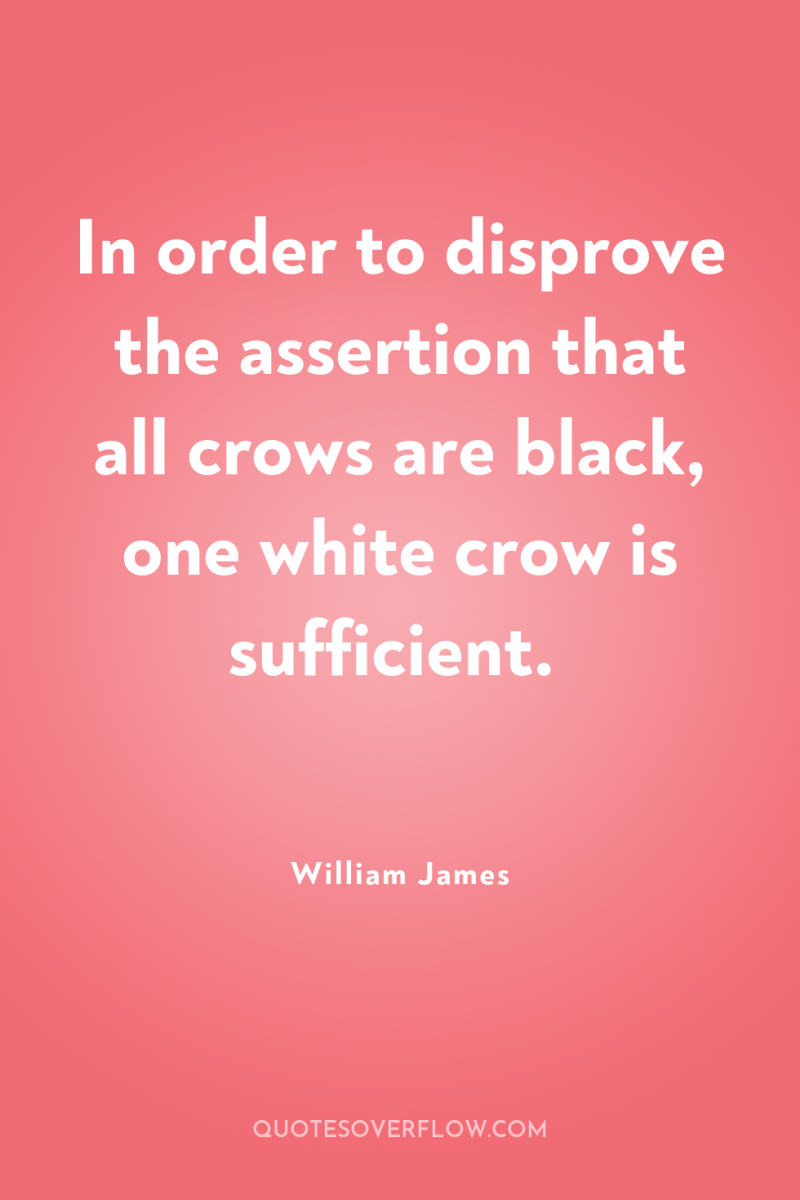
20
In order to disprove the assertion that all crows are black, one white crow is sufficient.William James
21
So you see that the process of education, taken in a large way, may be described as nothing but the process of acquiring ideas or conceptions, the best educated mind being the mind which has the largest stock of them, ready to meet the largest possible variety of the emergencies of life. The lack of education means only the failure to have acquired them, and the consequent liability to be 'floored' and 'rattled' in the vicissitudes of experience.William James
22
I hope that here in America more and more the ideal of the well-trained and vigorous body will be maintained neck by neck with that of the well-trained and vigorous mind as the two coequal halves of the higher education for men and women alike.William James
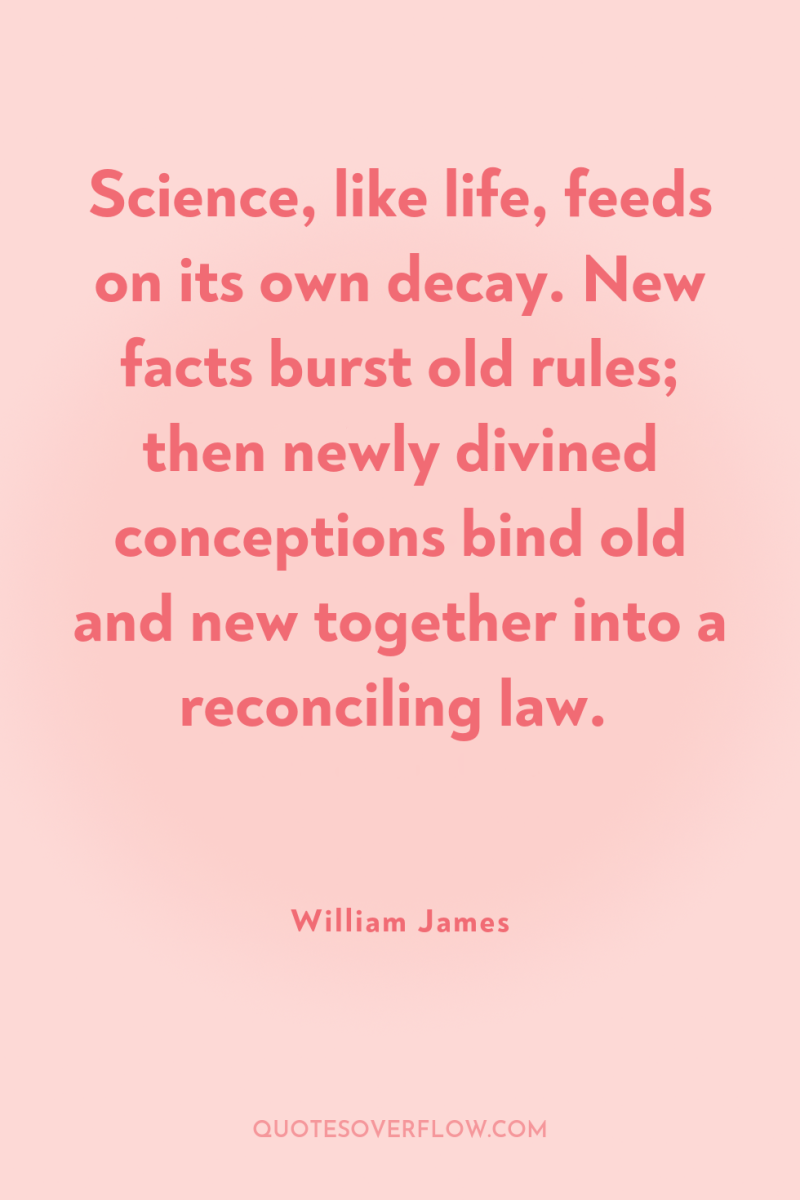
23
Science, like life, feeds on its own decay. New facts burst old rules; then newly divined conceptions bind old and new together into a reconciling law.William James
24
Round about the accredited and orderly facts of every science there ever floats a sort of dust-cloud of exceptional observations, of occurrences minute and irregular and seldom met with, which it always proves more easy to ignore than to attend to.. Anyone will renovate his science who will steadily look after the irregular phenomena, and when science is renewed, its new formulas often have more of the voice of the exceptions in them than of what were supposed to be the rules.William James
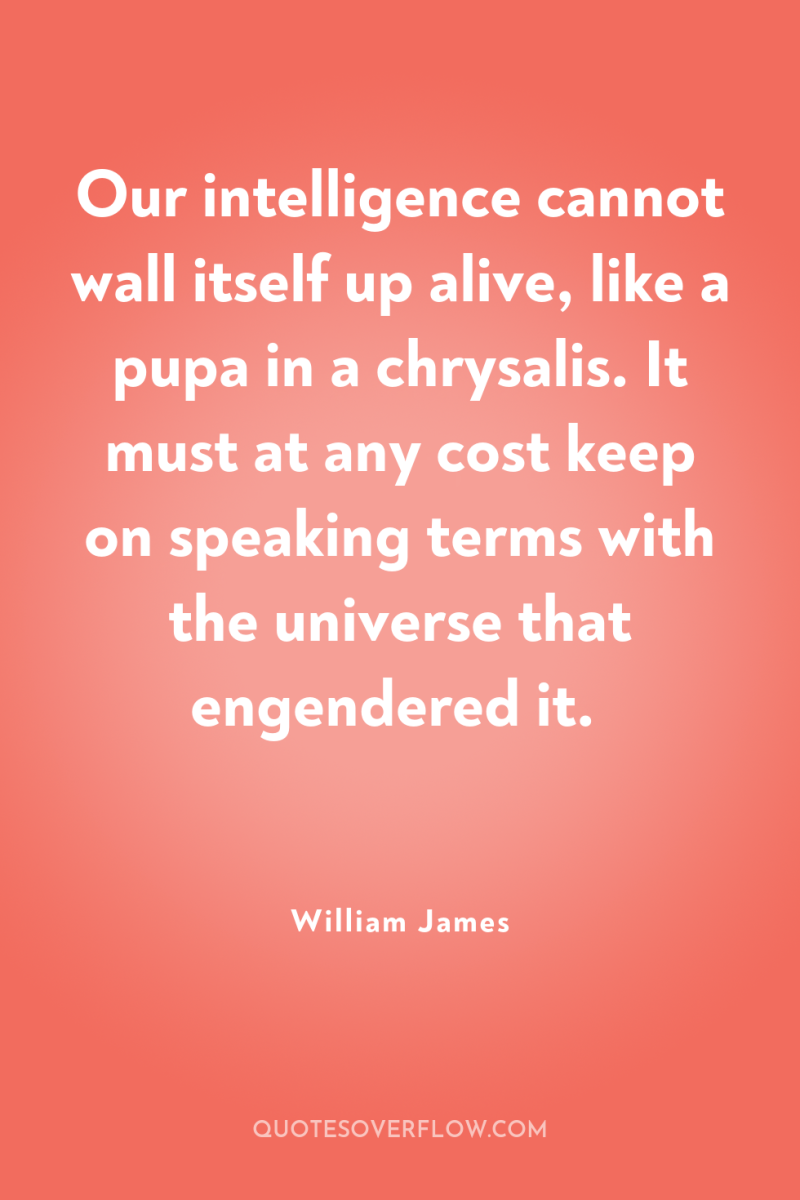
25
Our intelligence cannot wall itself up alive, like a pupa in a chrysalis. It must at any cost keep on speaking terms with the universe that engendered it.William James
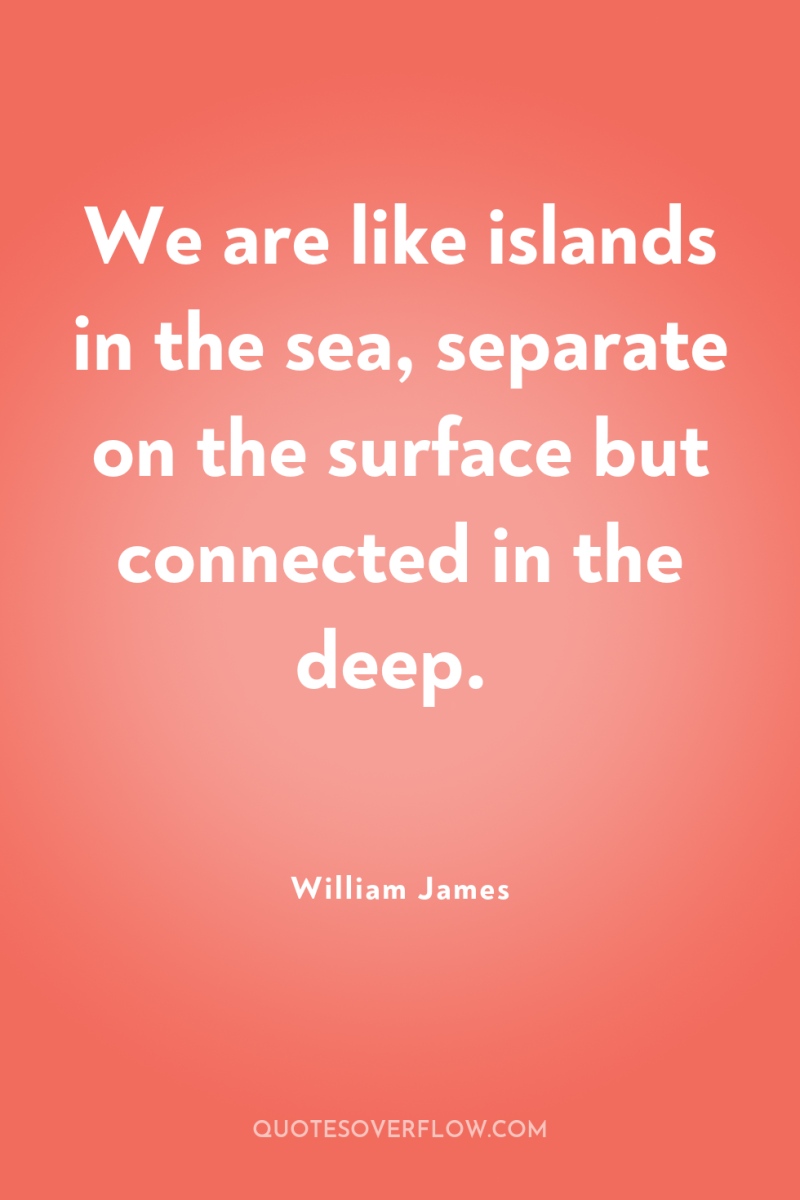
26
We are like islands in the sea, separate on the surface but connected in the deep.William James
27
Human beings are born into this little span of life of which the best thing is its friendships and intimacies … and yet they leave their friendships and intimacies with no cultivation, to grow as they will by the roadside, expecting them to "keep" by force of mere inertia.William James
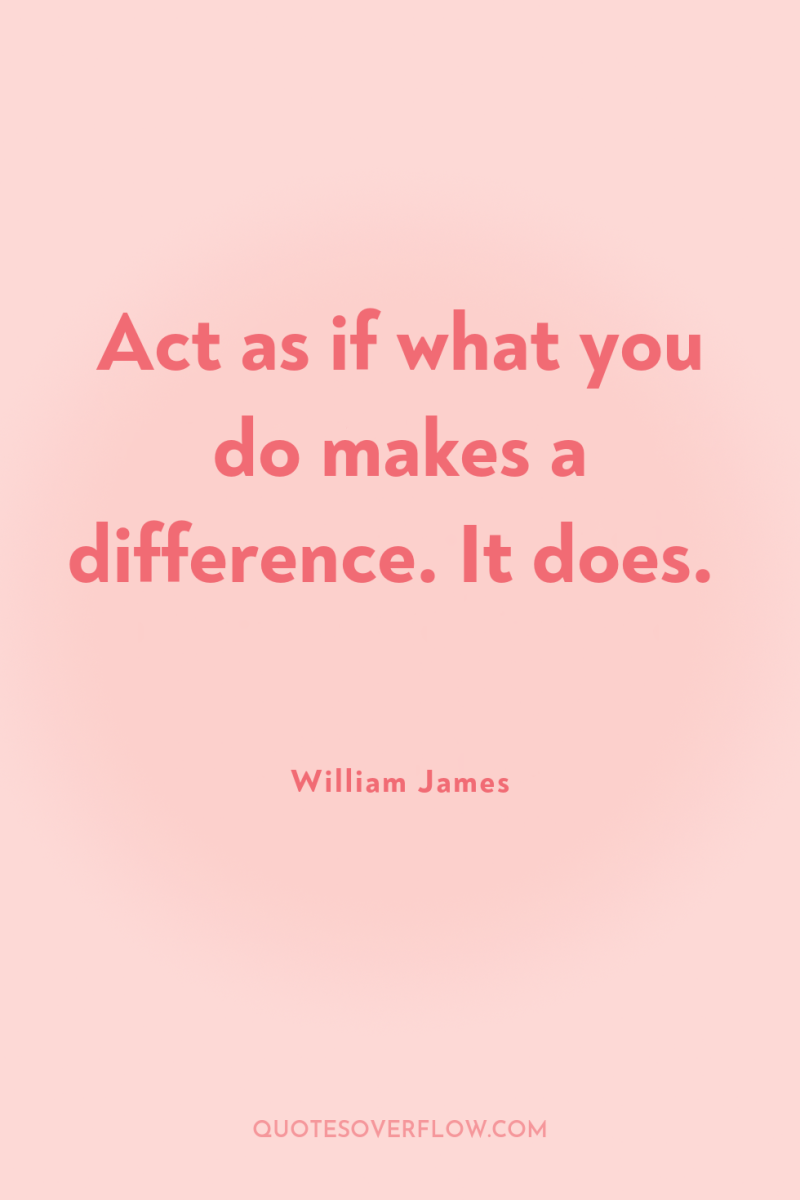
28
Act as if what you do makes a difference. It does.William James
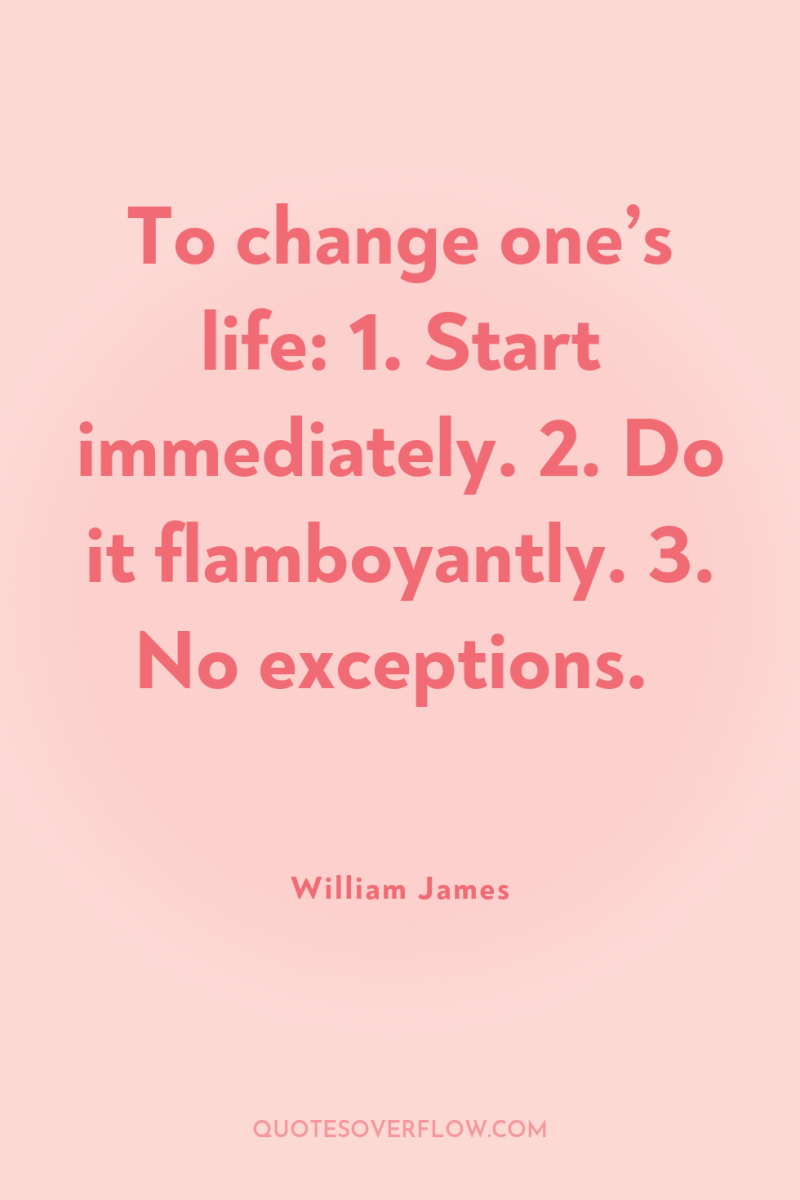
29
To change one’s life: 1. Start immediately. 2. Do it flamboyantly. 3. No exceptions.William James
30
Seek out that particular mental attribute which makes you feel most deeply and vitally alive, along with which comes the inner voice which says, 'This is the real me, ' and when you have found that attitude, follow it.William James
31
Work usually follows will.William James
32
The mind is at every stage a theater of simultaneous possibilities. Consciousness consists in the comparison of these with each other, the selection of some, and the suppression of the rest by the reinforcing and inhibiting agency of attention. The highest and most elaborated mental products are filtered from the data chosen by the faculty next beneath, out of the mass offered by the faculty below that, which mass in turn was sifted from a still larger amount of yet simpler material, and so on. The mind, in short, works on the data it receives very much as a sculptor works on his block of stone. In a sense the statue stood there from eternity. But there were a thousand different ones beside it, and the sculptor alone is to thank for having extricated this one from the rest. Just so the world of each of us, how so ever different our several views of it may be, all lay embedded in the primordial chaos of sensations, which gave the mere matter to the thought of all of us indifferently. We may, if we like, by our reasonings unwind things back to that black and jointless continuity of space and moving clouds of swarming atoms which science calls the only real world. But all the while the world we feel and live in will be that which our ancestors and we, by slowly cumulative strokes of choice, have extricated out of this, like sculptors, by simply removing portions of the given stuff. Other sculptors, other statues from the same stone! Other minds, other worlds from the same monotonous and inexpressive chaos! Your world is but one in a million alike embedded, alike real to those who may abstract them. How different must be the worlds in the consciousness of ant, cuttlefish, or crab! .William James
33
Each of us literally chooses, by his way of attending to things, what sort of universe he shall appear to himself to inhabit.William James
34
Why may we not be in the universe, as our dogs and cats are in our drawingrooms and libraries?William James
35
It is as if there were in the human consciousness a sense of reality, a feeling of objective presence, a perception of what we may call ‘something there, ’ more deep and more general than any of the special and particular ‘senses’ by which the current psychology supposes existent realities to be originally revealed. If this were so, we might suppose the senses to waken our attitudes and conduct as they so habitually do, by first exciting this sense of reality; but anything else, any idea, for example, that might similarly excite it, would have that same prerogative of appearing real which objects of sense normally possess.William James
36
There is no doubt that healthy-mindedness is inadequate as a philosophical doctrine, because the evil facts which it positively refuses to account for are a genuine portion of reality; and they may after all be the best key to life's significance, and possibly the only openers of our eyes to the deepest levels of truth.William James
37
Selection is the very keel on which our mental ship is built. And in this case of memory its utility is obvious. If we remembered everything, we should on most occasions be as ill off as if we remembered nothing.William James
38
But it is the bane of psychology to suppose that where results are similar, processes must be the same. Psychologists are too apt to reason as geometers would, if the latter were to say that the diameter of a circle is the same thing as its semi-circumference, because, forsooth, they terminate in the same two points.William James
39
Psychology is the science of mental lifeWilliam James
40
In certain diseased conditions consciousness is a mere spark, without memory of the past or thought of the future, and with the present narrowed down to some one simple emotion or sensation of the body.William James
41
No fact in human nature is more characteristic than its willingness to live on a chance. The existence of the chance makes the difference… between a life of which the keynote is resignation and a life of which the keynote is hope.William James
42
Most of us probably fall several times a day into a fit somewhat like this: The eyes are fixed on vacancy, the sounds of the world melt into a confused unity, the attention is dispersed so that the whole body is felt, as it were, at once, and the foreground of consciousness is filled, if by anything, by a sort of solemn sense of surrender to the empty passing of time. In the dim background of our mind we know meanwhile what we ought to be doing: getting up, dressing ourselves, answering the person who has spoken to us, trying to make the next step in our reasoning. But somehow we cannot start; the pensée de derrière la tête [thought at the back of the head] fails to pierce the shell of lethargy that wraps our state about. Every moment we expect the shell to break, for we know no reason why it should continue. But it does continue, pulse after pulse, and we float with it, until–also without reason that we can discover–an energy is given, something–we know not what–enables us to gather ourselves together, we wink our eyes, we shake our head, the background ideas become effective, and the wheels of life go round again.William James
43
A man's Self is the sum total of all that he can call his, not only his body and his psychic powers, but his clothes and his house.William James
44
We know the meaning so long as no one asks us to define it.William James
45
Beyond the very extremity of fatigue distress, amounts of ease and power that we never dreamed ourselves to own, sources of strength habitually not taxed at all, because habitually we never push through the obstructionWilliam James
46
Why should we think upon things that are lovely Because thinking determines life. It is a common habit to blame life upon the environment. Environment modifies life but does not govern life. The soul is stronger than its surroundings.William James
47
A new position of responsibility will usually show a man to be a far stronger creature than was supposed.William James
48
Not that I would not, if I could, be both handsome ..and well-dressed, and a great athlete, and make a million a year, be a wit, a bon-vivant, and a lady-killer, as well as a philosopher; a philanthropist, statesman, warrior, and African explorer, as well as a ‘tone poet’ and saint. But the thing is simply impossible… Such different characters may conceivably at the outset of life be alike possible to a man. But to make any one of them actual, the rest must more or less be suppressed. So the seeker of his truest, strongest, deepest self must review the list carefully, and pick out the one on which to stake his salvation. All other selves thereupon become unreal… .William James
49
Resign your destiny to higher powers.William James
50
Belief and doubt are living attitudes, and involve conduct on our part. Our only way, for example, of doubting, or refusing to believe, that a certain thing is, is continuing to act as if it were not.William James
51
Our faith is faith in some one else's faith, and in the greatest matters this is most the case. Our belief in truth itself, for instance, that there is a truth, and that our minds and it are made for each other, --what is it but a passionate affirmation of desire, in which our social system backs us up? We want to have a truth; we want to believe that our experiments and studies and discussions must put us in a continually better and better position towards it; and on this line we agree to fight out our thinking lives.William James
52
Since belief is measured by action, he who forbids us to believe religion to be true, necessarily also forbids us to act as we should if we did believe it to be true. The whole defence of religious faith hinges upon action. If the action required or inspired by the religious hypothesis is in no way different from that dictated by the naturalistic hypothesis, then religious faith is a pure superfluity, better pruned away, and controversy about its legitimacy is a piece of idle trifling, unworthy of serious minds. I myself believe, of course, that the religious hypothesis gives to the world an expression which specifically determines our reactions, and makes them in a large part unlike what they might be on a purely naturalistic scheme of belief. .William James
53
Now, my dear little girl, you have come to an age when the inward life develops and when some people (and on the whole those who have most of a destiny) find that all is not a bed of roses. Among other things there will be waves of terrible sadness, which last sometimes for days; irritation, insensibility, etc., etc., which taken together form a melancholy. Now, painful as it is, this is sent to us for an enlightenment. It always passes off, and we learn about life from it, and we ought to learn a great many good things if we react on it right. (For instance, you learn how good a thing your home is, and your country, and your brothers, and you may learn to be more considerate of other people, who, you now learn, may have their inner weaknesses and sufferings, too.) Many persons take a kind of sickly delight in hugging it; and some sentimental ones may even be proud of it, as showing a fine sorrowful kind of sensibility. Such persons make a regular habit of the luxury of woe. That is the worst possible reaction on it. It is usually a sort of disease, when we get it strong, arising from the organism having generated some poison in the blood; and we mustn't submit to it an hour longer than we can help, but jump at every chance to attend to anything cheerful or comic or take part in anything active that will divert us from our mean, pining inward state of feeling. When it passes off, as I said, we know more than we did before. And we must try to make it last as short as time as possible. The worst of it often is that, while we are in it, we don't want to get out of it. We hate it, and yet we prefer staying in it–that is a part of the disease. If we find ourselves like that, we must make something ourselves to some hard work, make ourselves sweat, etc.; and that is the good way of reacting that makes of us a valuable character. The disease makes you think of yourself all the time; and the way out of it is to keep as busy as we can thinking of things and of other people–no matter what's the matter with our self.William James
54
Through prayer, religion insists, things which cannot be realized in any other manner come about: energy which but for prayer would be bound is by prayer set free and operates in some part, be it objective or subjective, of the world of facts.William James
55
Wisdom is learning what to overlook.William James
56
Most people, probably, are in doubt about certain matters ascribed to their past. They may have seen them, may have said them, done them, or they may only have dreamed or imagined they did so.William James
57
It may be that no religious reconciliation with the absolute totality of things is possible. Some evils, indeed, are ministerial to higher forms of good; but it may be that there are forms of evil so extreme as to enter into no good system whatsoever…William James
58
My experience is what I agree to attend to.William James
59
Four Characters in Consciousness–How does it go on? We notice immediately four important characters in the process, of which it shall be the duty of the present chapter to treat in a general way:1) Every 'state' tends to be part of a personal consciousness. 2) Within each personal consciousness states are always changing. 3) Each personal consciousness is sensibly continuous.4) It is interested in some parts of its object to the exclusion of others, and welcomes or rejects–chooses from among them, in a word–all the while.William James
60
Action seems to follow feeling, but really action and feeling go together; and by regulating the action, which is under the more direct control of the will, we can indirectly regulate the feeling, which is not.William James
61
Earnestness means willingness to live with energy, though energy bring pain. The pain may be pain to other people or pain to one's self – it makes little difference; for when the strenuous mood is on one, the aim is to break something, no matter whose or what. Nothing annihilates an inhibition as irresistibly as anger does it; for, as Moltke says of war, destruction pure and simple is its essence. This is what makes it so invaluable an ally of every other passion. The sweetest delights are trampled on with a ferocious pleasure the moment they offer themselves as checks to a cause by which our higher indignations are elicited. It costs then nothing to drop friendships, to renounce long-rooted privileges and possessions, to break with social ties. Rather do we take a stern joy in the astringency and desolation; and what is called weakness of character seems in most cases to consist of the inaptitude for these sacrificial moods, of which one's own inferior self and its pet softnesses must often be the targets and the victims. .William James
62
Much of what we call evil can often be converted into a bracing and tonic good by a simple change of the sufferer's inner attitude from one of fear to one of fightWilliam James
63
There are no differences but differences of degree between different degrees of difference and no difference.William James
64
The question of being is the darkest in all philosophy.William James
65
Moral scepticism can no more be refuted or proved by logic than intellectual scepticism can. When we stick to it that there is truth (be it of either kind), we do so with our whole nature, and resolve to stand or fall by the results. The sceptic with his whole nature adopts the doubting attitude; but which of us is the wiser, Omniscience only knows.William James
66
All religions and spiritual traditions begin with the cry "Help!William James
67
I, therefore, for one, cannot see my way to accepting the agnostic rules for truth-seeking, or wilfully agree to keep my willing nature out of the game. I cannot do so for this plain reason, that a rule of thinking which would absolutely prevent me from acknowledging certain kinds of truth if those kinds of truth were really there, would be an irrational rule.William James
68
Everyone is familiar with the phenomenon of feeling more or less alive on different days. Everyone knows on any given day that there are energies slumbering in him which the incitements of that day do not call forth, but which he might display if these were greater. Most of us feel as if a sort of cloud weighed upon us, keeping us below our highest notch of clearness in discernment, sureness in reasoning, or firmness in deciding. Compared with what we ought to be, we are only half awake. Our fires are damped, our drafts are checked. We are making use of only a small part of our possible mental and physical resources. Stating the thing broadly, the human individual thus lives far within his limits; he possesses powers of various sorts which he habitually fails to use. .William James
69
Most people live in a very restricted circle of their potential being. They make use of a very small portion of their possible consciousness, and of their soul's resources in general, much like a man who, out of his whole organism should get into a habit of using and moving only his little finger.William James
70
To give up pretensions is as blessed a relief as to get them ratified.William James
71
The greatest discovery of our generation is that human beings can alter their lives by altering their attitudes of mind. As you think, so shall you be.William James
72
There is no more miserable human being than one in whom nothing is habitual but indecision.William James
73
Keep the faculty of effort alive in you by a little gratuitous exercise every day. That is, be systematically ascetic or heroic in little unnecessary points, do every day or two something for no other reason than that you would rather not do it, so that when the hour of dire need draws nigh, it may find you not unnerved and untrained to stand the test. So with the man who has daily inured himself to habits of concentrated attention, energetic volition, and self-denial in unnecessary things. He will stand like a tower when everything rocks around him, and when his softer fellow-mortals are winnowed like chaff in the blast. .William James
74
Philosophy lives in words, but truth and fact well up into our lives in ways that exceed verbal formulation.William James
75
Acceptance of what has happened is the first step to overcoming the consequence of any misfortune.William James
76
Be willing to have it so acceptance of what has happened is the first step to overcoming the consequences of any misfortune.William James
77
Men habitually use only a small part of the powers which they possess and which they might use under appropriate circumstances.William James
78
Be not afraid of life. Believe that life is worth living and your belief will help create the fact.William James
79
Fear of life in one form or another is the great thing to exorcise.William James
80
Man lives by habits indeed but what he lives for is thrill and excitements.... From time immemorial war has been ... the supremely thrilling excitement.William James
81
We have to live today by what truth we can get today and be ready tomorrow to call it falsehood.William James
82
When you have to make a choice and don't make it that is in itself a choice.William James
83
Acceptance of what has happened is the first step to overcoming the consequences of any misfortune.William James
84
Faith is one of the forces by which men live the total absence of it means collapse.William James
85
Human beings are born into this little span of life of which the best thing is its friendships and intimacies ... and yet they leave their friendships and intimacies with no cultivation to grow as they will by the roadside expecting them to "keep" by force of mere inertia.William James
86
The first thing to learn in intercourse with others is non-interference with their own peculiar ways of being happy provided those ways do not assume to interfere with ours.William James
87
Most men's friendships are too inarticulate.William James
88
Genius in truth means little more than the faculty of perceiving in an unhabitual way.William James
89
With mere good intentions hell is proverbially paved.William James
90
Action may not always bring happiness but there is no happiness without action.William James
91
The emotions are not always subject to reason ... but they are always subject to action. When thoughts do not neutralize an undesirable emotion action will.William James
92
The God of many men is little more than their court of appeal against the damnatory judgement passed on their failures by the opinion of the world.William James
93
As Charles Lamb says there is nothing so nice as doing good by stealth and being found out by accident so I now say it is even nicer to make heroic decisions and to be prevented by 'circumstances beyond your control' from ever trying to execute them.William James
94
Habit is the enormous flywheel of society its most precious conservative agent. There is no more miserable human being than one in whom nothing is habitual but indecision. Full half the time of such a man goes to the deciding or regretting of matters which ought to be so ingrained in him as practically not to exist for his consciousness at all.William James
95
An unlearned carpenter of my acquaintance once said in my hearing: 'There is very little difference between one man and another but what there is is very important.'William James
96
An idea to be suggestive must come to the individual with the force of a revelation.William James
97
Every time a resolve or fine glow of feeling evaporates without bearing fruit it is worse than a chance lost it works to hinder future emotions from taking the normal path of discharge.William James
98
Impulse without reason is not enough and reason without impulse is a poor makeshift.William James
99
Life is one long struggle between conclusions based on abstract ways of conceiving cases and opposite conclusions prompted by our instinctive perception of them.William James
100
The thinker philosophizes as the lover loves. Even were the consequences not only useless but harmful he must obey his impulse.William James